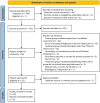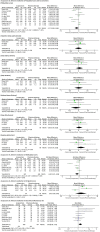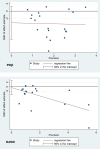The Role of Acupuncture in the Management of Insomnia as a Major or Residual Symptom Among Patients With Active or Previous Depression: A Systematic Review and Meta-Analysis
- PMID: 35492706
- PMCID: PMC9051249
- DOI: 10.3389/fpsyt.2022.863134
The Role of Acupuncture in the Management of Insomnia as a Major or Residual Symptom Among Patients With Active or Previous Depression: A Systematic Review and Meta-Analysis
Abstract
Background: Due to concerns about risks associated with antidepressants and/or hypnotics, complementary therapies such as acupuncture have been sought by patients with active or previous depression to manage insomnia. This systematic review aimed to clarify if acupuncture is effective and safe enough to be recommended as an alternative or adjuvant therapy to standard care in ameliorating concomitant or residual insomnia, two types of insomnia associated with depression.
Methods: Randomized controlled trials (RCTs) of depression-related insomnia (DI) treatment via acupuncture vs. waitlist-control or placebo-/sham-acupuncture and RCTs of DI treatment via acupuncture alone or combined with standard care [Western pharmacotherapy and/or cognitive-behavioral therapy (CBT)] vs. standard care alone were searched for from seven databases from inception to December 2021. Cochrane criteria were followed.
Results: Twenty-one studies involving 1,571 participants were analyzed. For insomnia as a major symptom of active depression, meta-analyses suggested that acupuncture significantly reduced the global scores of both the Pittsburg Sleep Quality Index (PSQI) [MD = -3.12, 95% CI (-5.16, -1.08), p < 0.01] and Hamilton Depression Scale (HAMD) [SMD = -2.67, 95% CI (-3.51, -1.84), p < 0.01], in comparison with placebo-acupuncture. When compared with conventional pharmacotherapy (antidepressants and/or hypnotics), the results favored acupuncture in decreasing PSQI [MD = -1.17, 95% CI (-2.26, -0.08), p = 0.03] and HAMD [SMD = -0.47, 95% CI (-0.91, -0.02), p = 0.04]. Acupuncture was comparable to conventional pharmacotherapy in reducing scores of each domain of PSQI. For insomnia as a residual symptom of previous or partially remitted depression, acupuncture conferred a very limited, non-significant therapeutic advantage against sham-/placebo-acupuncture. Whether acupuncture has an add-on effect to conventional pharmacotherapy in this type of insomnia has not been investigated. Also, no study was available to address the efficacy differences between acupuncture and CBT or the synergistic effect of these two therapies.
Conclusions: There is a low to moderate level of evidence supporting acupuncture as a safe and effective remedy alternative to or adjuvant to conventional pharmacotherapy (antidepressant and/or hypnotic) in improving insomnia and other depression symptoms among patients with active depression. Furthermore, the patients' complaint of disrupted sleep continuity is most likely to benefit from acupuncture. The benefit of acupuncture on residual insomnia associated with previous or partially remitted depression is limited. Future acupuncture studies need to consider applying optimal dosage and addressing deficiencies in trial quality.Systematic Review Registration: https://www.crd.york.ac.uk/prospero/display_record.php?ID=CRD42021269880, PROSPERO, identifier: CRD42021269880.
Keywords: RCT; acupuncture; depression; insomnia; meta-analysis; systematic review.
Copyright © 2022 Zhao, Kennedy, Spencer, Conduit, Zhang, Fu and Zheng.
Conflict of interest statement
The authors declare that the research was conducted in the absence of any commercial or financial relationships that could be construed as a potential conflict of interest.
Figures






References
Publication types
LinkOut - more resources
Full Text Sources

